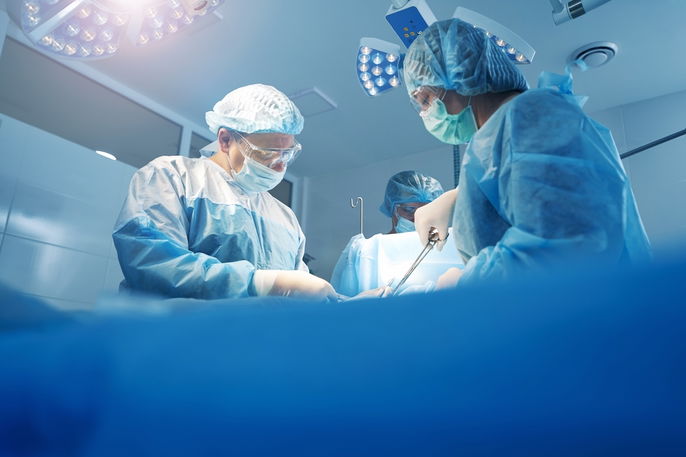Ulcer surgery is rarely indicated for the treatment of peptic ulcers, as most cases of ulcers are managed with medication and H. pylori cures. Ulcer surgery may be needed to correct serious complications, such as perforations or bleeding that is not controlled through an endoscope. These types of complications are associated with severe abdominal pain and can also lead to sepsis if left untreated.
Ulcer surgery is performed by a gastroenterologist using different techniques, such as videolaparoscopy, which is a less invasive procedure. They can opt for a more conventional surgery, called a laparotomy, which is done with a larger incision in the belly. This second option requires a longer recovery time.
Before considering ulcer surgery, your doctor will review all stomach ulcer treatments, with conservative approaches like diet changes, lifestyle modifications, and medications, and assess their efficacy.

When it is indicated
Ulcer surgery is indicated in the following situations:
- Uncontrolled or repeated bleeding
- Stomach ulcer with suspected cancer
- Frequent severe recurrences of peptic ulcers
- Stomach perforation
Ulcer surgery is usually considered one of the last resorts for treatment. Most times, medication prescribed by the doctor is effective and able to heal any stomach lesions. However, healing time can vary from person to person.
Also recommended: What Do Stomach Ulcers Feel Like? 7 Signs (& Symptom Checker) tuasaude.com/en/stomach-ulcer-symptomsBleeding can usually be managed by the doctor through endoscopy, while surgery is reserved only for the most serious cases.
How to prepare
There are some measures you should take to help prepare you for surgery, such as clarifying any questions you may have regarding the surgery and recovery with the gastroenterologist. You should inform him or her of all the medications, vitamins and supplements you may be on, as some can affect recovery or increase the risk for clots or bleeding. You should also inform the doctor of any allergies or other health conditions.
You are advised to avoid smoking or drinking alcohol before surgery. You should also avoid foods that could irritate stomach ulcers, such as spicy, heavily seasoned or acidic foods, caffeinated drinks such as coffee or black tea, as well as soda or carbonated beverages.
Before performing the surgery, the doctor will request surgical risk tests and blood tests to assess your general state of health.
How surgery is performed
Ulcer surgery is performed by a general surgeon in a hospital setting under general anesthesia. It lasts just around 2 hours, although the patient may need to be hospitalized for more than 3 days.
Types of surgery
Surgery for stomach ulcers can be carried out using different procedures, including:
- Partial gastrectomy: this is done by removing part of the stomach where the ulcer is. It is usually indicated when the ulcer is large and deep.
- Antrectomy: this is done by removing the lower part of the stomach, which is responsible for producing hormones that stimulate acid production.
- Pyloroplasty: to enlarge the opening of the pylorus, which is between the stomach and duodenum, in cases of narrowing, preventing the passage of food;
- Vagotomy: is performed by cutting or removing one or more branches of the vagus nerve, which helps to reduce stomach acid production that is stimulated by this nerve. A vagotomy is usually performed together with other surgical procedures, such as antrectomy or pyloroplasty.
Ulcer surgery is usually performed laparoscopically, which involves making a small cut in the area near the bellybutton to feed in a small tube with a camera on the end. Other surgical instruments are also fed through this tube to reach the stomach and repair the ulcer as needed.
In some cases. the surgery can be performed urgently, with a larger cut in the belly to allow the doctor to reach the stomach quickly. This is referred to as a laparotomy.
After surgery, the patient usually stays in hospital until there is no risk of developing complications, such as bleeding or infection, for example, and can return home around 3 days later.
Post-op care
After peptic ulcer surgery, your surgeon may recommend specific precautions to help facilitate your recovery. These may include:
- Consume clear fluids and food, and as the days go by (and according to the patient's tolerance) you can graduate to a soft diet with lightly seasoned food.
- Eat in small quantities several times throughout the day.
- Chew food thoroughly to facilitate digestion and absorption of nutrients
- Avoid fatty foods, spicy foods, fried foods, foods that are too cold or too hot;
- Avoid drinks containing caffeine such as coffee, black tea or green tea, lactose such as milk or yogurt, and fizzy drinks such as soft drinks or carbonated water;
- Get up and take short walks every hour to prevent clots from forming in the legs. However, you should avoid long walks, exertion and heavy lifting
- Drink water to hydrate your body, in the quantities recommended by your doctor.
In addition, you should take any medications prescribed by your doctor at the correct times and avoid taking medicines on your own, including vitamins, teas or home remedies, without your doctor's knowledge.
Also recommended: Gastritis Diet: What to Eat & Avoid If You Have Gastritis or Ulcers tuasaude.com/en/diet-menu-for-gastritis-and-ulcerPossible risks
One of the main risks of ulcer surgery is the formation of a fistula, which is an abnormal connection between the stomach and the abdominal cavity. Other risks include infections or bleeding. However, these complications are rare, especially after the patient has been discharged.






























